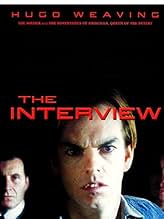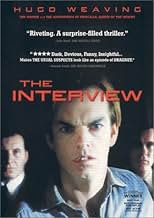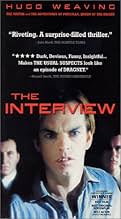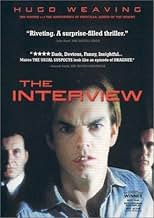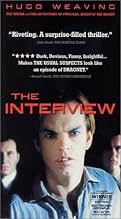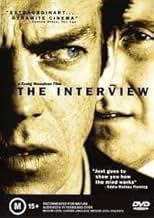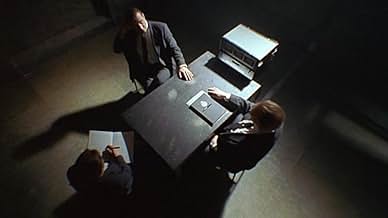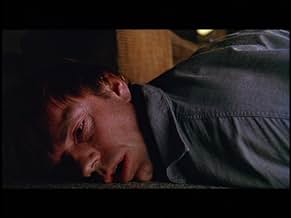Un duel entre un meurtrier présumé et un détective pressé par des gens qui veulent des résultats. Mais qui veut vraiment sa peau ?Un duel entre un meurtrier présumé et un détective pressé par des gens qui veulent des résultats. Mais qui veut vraiment sa peau ?Un duel entre un meurtrier présumé et un détective pressé par des gens qui veulent des résultats. Mais qui veut vraiment sa peau ?
- Réalisation
- Scénario
- Casting principal
- Récompenses
- 9 victoires et 13 nominations au total
Avis à la une
Despite Hollywood being awash with good Aussie actors and directors, generally our industry produces worthless dross.
This film, however, is one of the rare exceptions to that rule.
An "interview" is what police in Australia call an interrogation. This is a movie an excellent psycho drama about the relationship between a policemen and a suspect in one such interview.
The acting is good. And the directing is good. And most importantly, the story is good.
What a pity we haven't seen more from the writer/director team of Craig Monaghan and Gordon Davie.
This film, however, is one of the rare exceptions to that rule.
An "interview" is what police in Australia call an interrogation. This is a movie an excellent psycho drama about the relationship between a policemen and a suspect in one such interview.
The acting is good. And the directing is good. And most importantly, the story is good.
What a pity we haven't seen more from the writer/director team of Craig Monaghan and Gordon Davie.
Agent Smith (actually named Eddie Fleming in this film) is taking a nap when the police barge in, trash his apartment, intimidate him, arrest him, and throw him into an "interview room" accusing him of car theft. Soon a charge of murder is added and Fleming is really at a loss of what to do. At a loss, that is, until the story takes a few twists and we see that "the interview" is really a fierce battle of wits with strings being pulled from every direction...
The title may be a bit misleading for American audiences as it means "interrogation" not the type of interview you have for a prospective job position. That aside, this is a fantastic film that deserves notice. Hugo Weaving with the rest of the cast gives a terrific performance and the script could hardly offer more when coupled with Craig Monahan's direction. Taking place in only a few rooms of a police station for pretty much the whole length of the film, yet there is a genuine suspense and the film space feels as open as the expanse of the mystery at hand rather than cramped like the setting.
All in all, this is one terrific little film that should be worth any movie watcher's time. 10/10
Not Rated, but contains occasional profanity
The title may be a bit misleading for American audiences as it means "interrogation" not the type of interview you have for a prospective job position. That aside, this is a fantastic film that deserves notice. Hugo Weaving with the rest of the cast gives a terrific performance and the script could hardly offer more when coupled with Craig Monahan's direction. Taking place in only a few rooms of a police station for pretty much the whole length of the film, yet there is a genuine suspense and the film space feels as open as the expanse of the mystery at hand rather than cramped like the setting.
All in all, this is one terrific little film that should be worth any movie watcher's time. 10/10
Not Rated, but contains occasional profanity
Most audiences around the world would by now know who Austrialian actor Hugo Weaving is, after appearing in big budgeted Hollywood trilogies like The Matrix and The Lord of the Rings. The Interview presents one of his earlier works in an Australian film, and my, does he show off his acting chops in this.
Hugo Weaving plays Eddie Fleming, a simple man whose just been retrenched from his job, separated from his wife and living off state welfare. The film begins with him being literally yanked off his sofa chair at home, when the cops barge in and arrested him with strong arm tactics. Later he's told, that he's in for a car jacking incident.
However, Fleming pleads innocence to chief interrogator John Steele (played superbly too by Australian actor Tony Martin), who has a reputation of solving crimes, regardless of the methods used. It's one man against the other, as Fleming initially begins as an innocent helpless man, clueless to why he's bring held in a police station, undergoing an interrogation.
As we go along, we see a power play between the two men, as each try to gain one up against the other. We start to question Fleming's innocence, as he begins to drop various hints that he might be involved in the crime Steele is investigating, and perchance, might be the serial killer Steele is looking for. The tension built between the two is tremendous, and both hold court against each other. Also added to the subplot is the exploration of ethics into Steele's techniques, and the politics of policing, investigations and the conducting of interrogations and interviews.
It's excellent storytelling if you're willing to put up with little or no action, but laden with plenty of insightful dialogue. Weaving adds a beautiful dimension to the character of Fleming - innocent man, guilty sinner, schizophrenic, or just manipulator? You'll also learn a bit about the Australian police and justice process at the evidence gathering stage, and one in which Fleming takes advantage of quite skillfully.
So for fans of Hugo Weaving, you might want to pick up this DVD to check out his performance.
This Code 1 DVD contains the theatrical trailer, cast biographies, cast interviews with Hugo Weaving and Tony Martin, an audio commentary by the director/writer Craig Mohanan, and deleted scenes, one of which features an alternative ending.
Hugo Weaving plays Eddie Fleming, a simple man whose just been retrenched from his job, separated from his wife and living off state welfare. The film begins with him being literally yanked off his sofa chair at home, when the cops barge in and arrested him with strong arm tactics. Later he's told, that he's in for a car jacking incident.
However, Fleming pleads innocence to chief interrogator John Steele (played superbly too by Australian actor Tony Martin), who has a reputation of solving crimes, regardless of the methods used. It's one man against the other, as Fleming initially begins as an innocent helpless man, clueless to why he's bring held in a police station, undergoing an interrogation.
As we go along, we see a power play between the two men, as each try to gain one up against the other. We start to question Fleming's innocence, as he begins to drop various hints that he might be involved in the crime Steele is investigating, and perchance, might be the serial killer Steele is looking for. The tension built between the two is tremendous, and both hold court against each other. Also added to the subplot is the exploration of ethics into Steele's techniques, and the politics of policing, investigations and the conducting of interrogations and interviews.
It's excellent storytelling if you're willing to put up with little or no action, but laden with plenty of insightful dialogue. Weaving adds a beautiful dimension to the character of Fleming - innocent man, guilty sinner, schizophrenic, or just manipulator? You'll also learn a bit about the Australian police and justice process at the evidence gathering stage, and one in which Fleming takes advantage of quite skillfully.
So for fans of Hugo Weaving, you might want to pick up this DVD to check out his performance.
This Code 1 DVD contains the theatrical trailer, cast biographies, cast interviews with Hugo Weaving and Tony Martin, an audio commentary by the director/writer Craig Mohanan, and deleted scenes, one of which features an alternative ending.
7=G=
"The Interview" dedicates most of it's run time to a police interview (Aussie for interrogation) of a suspect in a stolen car case. The interview is supposed to be a process where questions are asked and answered in an attempt to discern the truth of a matter. In this film, however, one question leads to another and another and so on until the truth seems inextricably buried and the usually clear line between good and evil becomes blurred beyond recognition. An dark, claustrophobic, artfully presented all-business psychodrama out of Australia, "The Interview" will prove an enjoyable watch for those into mind game flicks. With good acting by all, special kudos to Weaving for an excellent performance.
This is a must-watch Aussie thriller! Hugo Weaving and Tony Martin both have delivered an extraordinary screen performances... The story revolves around an official police interview, Tony Martin (Det St John Steele) is inquiring Hugo Weaving (Fleming) who is an out-of-job-and-broke individual and has lost everything in life including his wife and home! What is the interview about, why is Fleming picked from his home disgracefully by police and put into interview, all has to be seen and known. "The interview" will keep you stick to the chair and unveil the unsaid truths and nature of human beings. A MUST SEE!
Le saviez-vous
- AnecdotesCame out one year before The Matrix (1999), which made Hugo Weaving incredibly famous.
- Citations
Det. Sr. Const. Wayne Prior: It's about a fucking stolen fucking car, you fucking fuckwit!
- Crédits fousAt the beginning of the New Yorker Video DVD, right before the main menu appears, a quote of Eddie Fleming fills the screen: "Just goes to show you how the mind works." At the very end, after the credits roll, a quote of Det. Steele fills the screen: "I don't know Mr. Fleming, how does the mind work?" But if you run the end credits a second time a different quote appears at the end, this time from Det. Prior: "It's about a fucking stolen fucking car you fucking fuckwit."
Meilleurs choix
Connectez-vous pour évaluer et suivre la liste de favoris afin de recevoir des recommandations personnalisées
- How long is The Interview?Alimenté par Alexa
Détails
Box-office
- Budget
- 2 600 000 $AU (estimé)
- Durée
- 1h 44min(104 min)
- Couleur
- Mixage
- Rapport de forme
- 1.85 : 1
Contribuer à cette page
Suggérer une modification ou ajouter du contenu manquant

